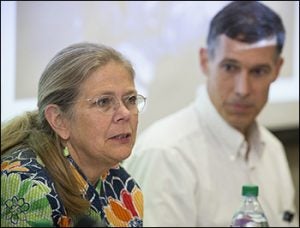A GLOBAL ISSUE
ECU experts discuss Ebola crisis
Ebola preparation at ECU
As the country braces for more diagnoses of Ebola, ECU is making plans to ensure the campus community remains safe and protected from the virus.
Bill Koch, associate vice chancellor for environmental health and safety, said, “Although experts believe that Ebola poses a low risk to Greenville and ECU, our communicable disease team is working with Vidant, the Pitt County Health Department and other UNC schools to update our plans, coordinate efforts and resources and prepare our staff just in case.”
Among the ongoing efforts of campus officials:
- The UNC campus system is in constant communication with infectious disease experts at the state health department and CDC. All campuses are sharing information and are getting prepared should any further action be needed.
- The ECU Communicable Disease Outbreak Planning Committee has been convening for the past several months, focused on identifying potential needs and action steps for various emergency scenarios, including influenza and Ebola.
- The committee is comprised of ECU experts as well as members of the local health care community, including Vidant, Pitt County Health Department and Pitt County Emergency Management, to ensure collaboration and sharing of resources.
- A section of the ECU Alert website has been dedicated to the aggregation of campus-wide resources for Ebola.
- Ebola awareness has been promoted to students and faculty who potentially traveled to West Africa; a handout illustrates what steps should be taken if travel has occurred.
- An “Ebola: the facts, not the hype” blog post was shared by Student Health Services to clarify truths about the virus.
- The Anthropology Student Organization and the ECU Chapter of Project Tumara hosted an Ebola Awareness Week. Events included an informational booth on Oct. 7 and a bake sale benefitting relief in Sierra Leone on Oct. 8.
As fears about Ebola continue to spread much faster than the virus itself, experts from East Carolina University offered their perspectives on the issue during a panel discussion on Oct. 16.
During “Ebola: African Dilemma or Global Health Crisis?” eight multi-disciplinary panelists presented to a standing-room-only crowd of 175 attendees before opening the floor to questions.
Dr. Paul Cook, an infectious disease expert from ECU’s Brody School of Medicine, said he felt confident about the infrastructure and an ability to control the virus locally if it became necessary, but that he does not anticipate seeing a case in Greenville. “I don’t think we need to fear Ebola. I think we need to fear the fear of Ebola,” he said.
The Ebola virus first appeared in 1976 in the Democratic Republic of Congo. The current epidemic is focused largely in Liberia, Sierra Leone and Guinea. According to the New England Journal of Medicine, it is by far the most severe Ebola outbreak in history, exceeding the death totals from all previous outbreaks added together.

An overflow crowd gathered to listen to a panel of ECU experts as they shared their perspectives on Ebola Oct. 16.
A native of Sierra Leone, graduate student Issa Thullah served on the panel to offer his unique insight about the western region of Africa. He said he doesn’t personally know of anyone infected with the virus, but he has heard of many cases in his hometown of Freetown.
“Misconceptions are rampant there, and it fuels a strong distrust of doctors,” he told the crowd. “There have been decades of injustice, abuse and corruption by government officials and health care providers who are supposed to protect the public in Sierra Leone.”
Holly Mathews, a professor of anthropology, added, “It’s hard for Americans to conceptualize the health care system in Africa because it’s virtually non-existent. There’s a lot of suspicion and paranoia about attempts to keep patients in isolation and prevent the spread of disease.”
Also featured on the panel were: Alethia Cook, director of ECU’s Security Studies program; Viva Reynolds from Geography, Planning and Environment; Dr. Kristina Simeonsson, an associate professor at the Brody School of Medicine and public health expert; Angela Thompson from the Department of History; and Bob Thompson from the Department of Public Administration.
The Q&A session allowed attendees to address their concerns directly with local experts on infectious disease and pandemics.
Jen Fox, a sophomore in political science, said she would be getting extra credit by attending the event, but that she planned to be there anyway.
“We hear so much on the news about it,” she said. “I really wanted to hear from Dr. (Alethia) Cook on the issue, since I’ve had a class with her and I trust her expertise, instead of just reading Facebook articles that people keep sharing.”

Holly Mathews, left, from the ECU Department of Anthropology and Paul Cook, Internal Medicine / Infectious Disease at Brody School of Medicine, spoke about the Ebola outbreak at the Oct. 16 event.
The World Health Organization reported a total of 4,493 deaths out of 8,998 suspected cases as of Oct. 15. There have only been three cases of Ebola diagnosed in the U.S., and the virus can only be spread by direct contact with the blood or bodily fluids of an infected person after symptoms have developed.
“The risk (of transmission) is highest when someone is exhibiting symptoms and is at their sickest, so that’s good, because people won’t be at Harris Teeter or Starbucks when they’re sick anyway,” Simeonsson said.
And to answer the question posed in the name of the event, the panelists agreed: we’re all in it together. Ebola is a global problem, not just Africa’s.
“This is definitely a worldwide issue. In addition to airlines canceling flights in and out of the area, you’ve got health care workers being sent from all over,” Reynolds said. “And there’s a significant economic impact as oil exports through Nigeria are now being affected.”
